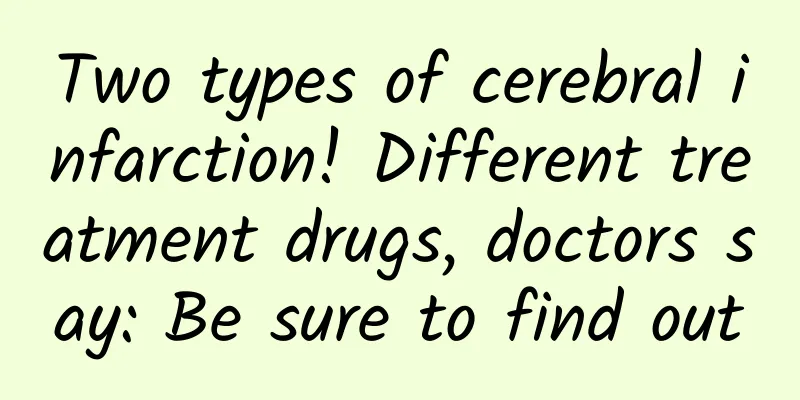Two types of cerebral infarction! Different treatment drugs, doctors say: Be sure to find out

|
Cerebral infarction has become the number one disease that threatens our life and health. The biggest harm of cerebral infarction is that it causes sequelae, causing patients to suffer from hemiplegia, hemiplegia, aphasia, long-term bed rest, and inability to take care of themselves. It not only brings great pain to the patient, but also brings disaster to the entire family. The causes of cerebral infarction are actually different, and the treatment principles for different cerebral infarctions are different. 1. Causes of cerebral infarction The direct cause of cerebral infarction is thrombosis. Simply put, thrombosis blocks cerebral blood vessels, which is cerebral infarction. However, the causes of thrombosis are not the same. They can be roughly divided into two types. One is atherosclerosis and plaque formation. For example, unstable plaques in the carotid artery will form thrombi after rupture. This thrombus will flow into the cerebral blood vessels with the blood flow, blocking the cerebral blood vessels and causing cerebral infarction, which accounts for almost 1/3 of cerebral infarction. There is also a part of thrombosis that is not caused by plaques in the carotid artery, but it can also be caused by atherosclerosis. The root cause of this type of cerebral infarction and cerebral infarction caused by carotid artery plaques is atherosclerosis. Another common type of blood clot is a blood clot caused by heart disease, especially a type of arrhythmia called atrial fibrillation. Atrial fibrillation means that the heart cannot beat normally, and blood clots are easily formed in the atria. If the blood clots break off, they will flow into the cerebral blood vessels with the blood flow, causing cerebral infarction. Many people think that as long as it is a cerebral infarction, taking aspirin can prevent thrombosis. In fact, this is not entirely true. Only when we first recognize whether the thrombosis is caused by atrial fibrillation or atherosclerosis, can we know how to treat it and how to use medication. 2. Different medications for different cerebral infarctions 1. Thrombosis caused by atherosclerosis The treatment basis of this type of cerebral infarction is aspirin and statins. Statins can reduce bad blood lipids and increase good blood lipids, thereby reducing vascular garbage and effectively controlling atherosclerosis. Statins can also fight inflammation and stabilize plaques, prevent plaque rupture, and effectively control arterial plaques, thereby preventing thrombosis and cerebral infarction. Aspirin can resist platelet aggregation, thereby preventing thrombosis and cerebral infarction. Therefore, aspirin plus statin is the basis for controlling this type of atherosclerotic cerebral infarction. Of course, there are many reasons that lead to the aggravation of atherosclerosis, such as high blood pressure and diabetes. If hypertension is combined, antihypertensive drugs will also be used. First of all, antihypertensive drugs such as pril and sartan have a certain effect on protecting blood vessels. At the same time, people with diabetes will also use hypoglycemic drugs or insulin. Only when blood pressure and blood sugar are well controlled can the progression of atherosclerosis be effectively controlled. At the same time, the blood lipids of these patients, especially low-density lipoprotein cholesterol, theoretically need to be reduced to below 1.8, so that the risk of another cerebral infarction will be lower. 2. Thrombosis caused by arrhythmia and atrial fibrillation I have encountered many patients with cerebral infarction caused by atrial fibrillation, and found that they also took aspirin to prevent thrombosis. In fact, this is wrong. Aspirin can indeed prevent thrombosis, but aspirin prevents the formation of atherosclerotic thrombosis by inhibiting platelet aggregation. The formation mechanism of blood clots caused by atrial fibrillation is different, and anticoagulants are needed to effectively prevent blood clots. Commonly used anticoagulants include warfarin, rivaroxaban, dabigatran and other drugs. These drugs are anticoagulants. For most patients with atrial fibrillation, the use of aspirin has basically no anticoagulant effect. Therefore, patients with atrial fibrillation must take regular anticoagulation to prevent blood clots and prevent another cerebral infarction. In short, the incidence of cerebral infarction is getting higher and higher. We must develop a healthy lifestyle, focus on prevention, and monitor the three highs and control the three highs. For those who have already had a cerebral infarction, we should prevent another cerebral infarction, but first we have to find out the cause of cerebral infarction. We can't take medicine blindly, especially those patients with atrial fibrillation and cerebral infarction who think that taking aspirin is effective, which will delay the disease! |
Recommend
What are the symptoms of menstrual disorders?
Many women experience delayed or early menstruati...
Breastfeeding two months after delivery
If you see spotting while breastfeeding two month...
Why are menstrual cycles getting shorter?
The menstrual cycle is getting shorter and shorte...
Counterpoint: Samsung's global foldable screen shipments plummeted 42% year-on-year in Q1 2024
Samsung, which once had an absolute advantage in ...
What should you pay attention to during minimally invasive visual painless abortion?
Minimally invasive visual painless abortion is a ...
Stomach pain after taking birth control pills
Birth control pills are a common method of contra...
At what age do women start to gain weight?
Most female friends pay more attention to their f...
The order of makeup application steps
Nowadays, more and more women will wear makeup wh...
Is breast augmentation surgery painful?
The beauty of a lady is not only about her appear...
Can I wash my hair during my aunt's period?
People of the older generation always say that it...
What to eat during pregnancy to make your baby's skin white
From the moment of pregnancy, parents begin to wo...
[Medical Q&A] Is papaya reliable for breast enlargement?
Planner: Chinese Medical Association Reviewer: Yu...
Correct sleeping position for narrow pelvis
People with anterior pelvic tilt are generally no...
What is the cause of the swelling and pain of the vulva?
Frictional swelling and pain in the vulva is also...
What is the true identity of the male protagonist in Penglaijian? What is the ending of the male protagonist in Penglaijian?
The fantasy drama Penglaijian starring Ji Xiaobin...









